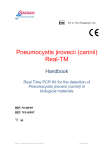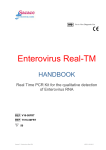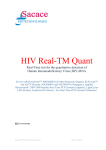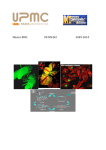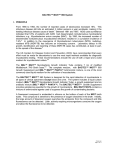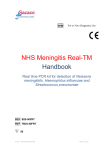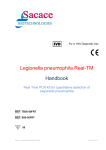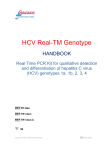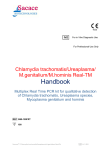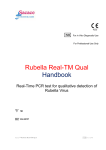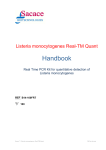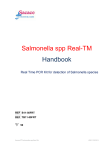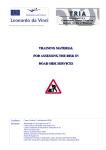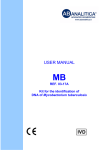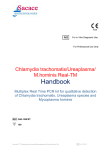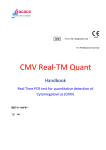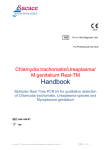Download MTB Real TM RG SC IQ MX A LC Eng NEW ver - bio
Transcript
For in Vitro Diagnostic Use MTB Real-TM HANDBOOK Real Time PCR kit for the detection of Mycobacterium tuberculosis complex REF B15-50FRT REF TB15-50FRT 50 Sacace™ MTB Real-TM VER 21.03.2013 Sacace™ MTB Real-TM VER 21.03.2013 NAME MTB Real-TM INTRODUCTION Tuberculosis (abbreviated as TB for tubercle bacillus) is a common and deadly infectious disease caused by mycobacteria, mainly Mycobacterium tuberculosis. Tuberculosis most commonly attacks the lungs (as pulmonary TB) but can also affect the central nervous system, the lymphatic system, the circulatory system, the genitourinary system, bones, joints and even the skin. Other mycobacteria such as Mycobacterium bovis, Mycobacterium africanum and Mycobacterium microti can also cause tuberculosis. Over one-third of the world's population has been infected by the TB bacterium, and new infections occur at a rate of one per second. Not everyone infected develops the full-blown disease; asymptomatic, latent TB infection is most common. However, one in ten latent infections will progress to active TB disease, which, if left untreated, kills more than half of its victims. In 2004, mortality and morbidity statistics included 14.6 million chronic active TB cases, 8.9 million new cases, and 1.6 million deaths, mostly in developing countries. In addition, a rising number of people in the developed world are contracting tuberculosis because their immune systems are compromised by immunosuppressive drugs, substance abuse, or HIV/AIDS. Early diagnosis of tuberculosis makes effective treatment possible and increases the probability of clinical outcome owing to quite effective antituberculosis therapy, however the tuberculosis diagnosis has certain difficulties. According to international standards, tuberculosis diagnosis must be confirmed either by bacteriology or by histology studies, but the bacteriological methods do not always allow to detect Mycobacterium tuberculosis in people affected with pulmonary tuberculosis and especially with extrapulmonary tuberculosis. The application of molecular biology methods allow to overcome the difficulties in the diagnosis of Mycobacterium tuberculosis, but due to the biological peculiarities of this microorganism and immune response of human organism, tuberculosis can not be diagnosed only by one method. Direct and indirect diagnostic methods are applied in phthisiology. Smear bacterioscopy with Ziehl Neelsen stain technique is a rapid and cheap method, but it has low sensitivity, not high specificity, and cannot differentiate TB from nontuberculous mycobacteria. The diagnostic sensitivity of the method doesn't exceed 20-40%. Smear fluorescence microscopy is a more sensitive method, requiring less enlargement of the microscope during the study and thus allowing to observe a larger area if compared to the standard microscopy with immersion system, which increase the detection rate by 17%. Culture have high sensitivity and specificity however due to a slow-growing tendency it takes 2-12 weeks to get a result. The indirect methods such as X-ray diagnostics, CAT, tuberculin diagnostics, detection of tuberculosis antibodies do not directly identify TB; however, they give an understanding of current changes in organs. Sacace™ MTB Real-TM VER 21.03.2013 INTENDED USE kit MTB Real-TM is a test for Real Time qualitative detection of Mycobacterium tuberculosis complex (M. tuberculosis, M. africanum, M. bovis, M. bovis BCG, M. microti) in the sputum, urine, bronchial lavages, tissue and other biological materials. PRINCIPLE OF ASSAY kit MTB Real-TM is a Real-Time Amplification test for the qualitative detection of Mycobacterium tuberculosis complex in biological materials. Mycobacterium tuberculosis DNA is extracted from samples, amplified using Real Time Amplification and detected using fluorescent reporter dye probes specific for M. tuberculosis and M. tuberculosis IC. M. tuberculosis IC is DNA fragment of IS 6110 insertion of Mycobacterium tuberculosis modified and cloned in bacteriophage λ, containing DNA fragments used in the kit as matrix for primers. Internal Control (IC) serves as an amplification control for each individually processed specimen and to identify possible reaction inhibition. IC is detected in a channel other than the M. tuberculosis DNA. MTB Real-TM kit contains UDG-Enzyme which is added to the reaction mix. Since deoxyuridine triphosphate (dUTP) is only present in amplicon while deoxythymidine triphosphate (dTTP) is present in MTB DNA the use of UDG enzyme degrades only amplicons generated from previous runs avoiding possibility of amplicon contamination. UDG is active at room temperature during Mastermix preparation, while during amplification is inactive, not affecting the correct and wanted experiment’s amplicon. Sacace™ MTB Real-TM VER 21.03.2013 MATERIALS PROVIDED Module No.1: Real Time PCR kit (B15-50FRT) Part N° 2 – “Controls” • C+ MTB & IC, 0,1 ml; • Negative Control C-, 1,2 ml;* • MTB IC, 1,0 ml;** • DNA-buffer, 0,5 ml; Part N° 3 – “MTB Real-TM”: Real Time amplification • PCR-mix-1, 2 x 0,28 ml; • PCR Buffer Flu, 0,28 ml; • TaqF Polymerase, 0,03 ml; • UDG-Enzyme, 0,03 ml. Contains reagents for 55 tests. Module No.2: Complete Real Time PCR test with DNA purification kit (TB15-50FRT) Part N° 1 – “DNA/RNA Prep”: Sample preparation • Lysis Sol, 15 ml; • Prec Sol, 20 ml; • Washing Sol 3, 25,0 ml; • Washing Sol 4, 10,0 ml • RE-buffer, 4 x 1,2 ml; Contains reagents for 50 extractions Part N° 2 – “Controls” • C+ MTB & IC, 0,1 ml; • Negative Control C-, 1,2 ml;* • MTB IC, 1,0 ml;** • DNA-buffer, 0,5 ml; Part N° 3 – “MTB Real-TM”: Real Time amplification • PCR-mix-1, 2 x 0,28 ml; • PCR Buffer Flu, 0,28 ml; • TaqF Polymerase, 0,03 ml; • UDG-Enzyme, 0,03 ml. Contains reagents for 55 tests. *must be used in the isolation procedure as Negative Control of Extraction. **add 10 µl of Internal Control during the DNA isolation directly to the sample/lysis mixture. Sacace™ MTB Real-TM VER 21.03.2013 MATERIALS REQUIRED BUT NOT PROVIDED Zone 1: sample preparation: • DNA extraction kit (Module No. 1) • Biological cabinet • Vortex • 65°C ± 2°C dry heat block • Desktop microcentrifuge for “eppendorf” type tubes (RCF max. 16,000 x g) • Tube racks • Microcentrifuge tubes, 1,5 - 2,0 ml • Pipettes with sterile, RNase-free filters tips • Biohazard waste container • Disposable gloves, powderless • Refrigerator, Freezer Zone 2: Real Time amplification: • Real Time Thermalcycler • Tubes or PCR plate • Workstation • Pipettes with sterile, RNase-free filters tips • Tube racks STORAGE INSTRUCTIONS Store kit at 2-8°C. Part N° 3 – “MTB Real-TM” must be stored at -20°C. The kit can be shipped at 2-8°C but should be stored at 2-8°C and -20°C immediately on receipt. Store DNA/RNA Prep kit at 2-25°C. STABILITY MTB Real-TM is stable up to the expiration date indicated on the kit label. The product will maintain performance through the control date printed on the label. Exposure to light, heat or humidity may affect the shelf life of some of the kit components and should be avoided. Repeated thawing and freezing of these reagents should be avoided, as this may reduce the sensitivity. Components stored under conditions other than those stated on the labels may not perform properly and may adversely affect the assay results. QUALITY CONTROL In accordance with Sacace’s ISO 13485-Certified Quality Management System, each lot is tested against predetermined specifications to ensure consistent product quality. Sacace™ MTB Real-TM VER 21.03.2013 WARNINGS AND PRECAUTIONS In Vitro Diagnostic Medical Device For In Vitro Diagnostic Use Only The user should always pay attention to the following: • Lysis Solution contains guanidine thiocyanate*. Guanidine thiocyanate is harmful if inhaled, or comes into contact with skin or if swallowed. Contact with acid releases toxic gas. (Xn; R: 20/21/22-36/37/38; S: 36/37/39). • Component Prec Sol contains 2-propanol: flammable. Irritant. (R10-36-67, S7-16-24/2526). Avoid contact with skin and eyes, S26: In case of contact with eyes, rinse immediately with plenty of water and seek medical advice; • Use sterile pipette tips with aerosol barriers and use new tip for every procedure. • Store extracted positive material (samples, controls and amplicons) away from all other reagents and add it to the reaction mix in a separate area. • Thaw all components thoroughly at room temperature before starting an assay. • When thawed, mix the components and centrifuge briefly. • Use disposable gloves, laboratory coats and eye protection when handling specimens and reagents. Thoroughly wash hands afterwards. • Do not eat, drink, smoke, apply cosmetics, or handle contact lenses in laboratory work areas. • Do not use a kit after its expiration date. • Dispose of all specimens and unused reagents in accordance with local authorities’ regulations. • Specimens should be considered potentially infectious and handled in a biological cabinet in accordance with appropriate biosafety practices. • Clean and disinfect all sample or reagent spills using a disinfectant such as 0.5% sodium hypochlorite, or other suitable disinfectant. • Avoid sample or reagent contact with the skin, eyes, and mucous membranes. If skin, eyes, or mucous membranes come into contact, rinse immediately with water and seek medical advice immediately. • Material Safety Data Sheets (MSDS) are available on request. • Use of this product should be limited to personnel trained in the techniques of DNA amplification. • The laboratory process must be one-directional, it should begin in the Extraction Area and then move to the Amplification and Detection Areas. Do not return samples, equipment and reagents to the area in which the previous step was performed. Some components of this kit contain sodium azide as a preservative. Do not use metal tubing for reagent transfer. * Only for Module No.2 Sacace™ MTB Real-TM VER 21.03.2013 PRODUCT USE LIMITATIONS All reagents may exclusively be used in in vitro diagnostics. Use of this product should be limited to personnel trained in the techniques of DNA amplification (EN375). Strict compliance with the user manual is required for optimal PCR results. Attention should be paid to expiration dates printed on the box and labels of all components. Do not use a kit after its expiration date. SAMPLE COLLECTION, STORAGE AND TRANSPORT MTB Real-TM can analyze DNA extracted from: • Sputum, bronchial or tracheal lavage must be treated with the following procedure: o Collect sputum into 50 mL single-use PP tubes with a screw cap. o In a biological safety cabinet, homogenize samples after mixing with equal volume of 4% NaOH solution. (N-acetyl-L-cysteine may be added if required in the amount of 50-70 mg per sample). Mix intensely with a tube rotator for 5-20 minutes (depending on the density of a sample). o Centrifuge samples at 3000 rpm (2800-3000 g) for 15 min and carefully discard the supernatant leaving 500-1000 µl in the tube. Resuspend sediment and transfer it into a 1.5 ml tube. o Centrifuge samples at 12000 rpm for 5-10 min, discard the supernatant and use the same 1,5 ml sample tube for DNA isolation from sample sediment. • tissue (~1,0 gr) homogenized with mechanical homogenizer or scalpel, glass sticks, teflon pestles and dissolved in 1,0 ml of saline water or PBS sterile (1 volume of tissue to 1 volumes of saline solution). Vortex vigorously and incubate 30 min at room temperature. Transfer the supernatant into a new 1,5 ml tube; • whole blood collected in either ACD or EDTA tubes; • liquor stored in “Eppendorf” tube; • sinovial liquid stored in “Eppendorf” tube; • urine sediment (use the intermedium part of stream); • pleuric versament stored in “Eppendorf” tube; • mycobacterium liquid culture conserved in Trilon-B; Specimens can be stored at +2-8°C for no longer than 48 hours, or freeze at -20°C to -80°C. Transportation of clinical specimens must comply with country, federal, state and local regulations for the transport of etiologic agents. DNA ISOLATION The following kit is recommended: DNA/RNA Prep (Sacace, REF K-2-9) Please carry out DNA extraction according to the manufacture’s instruction. Add 10 µl of Internal Control during DNA isolation procedure directly to the sample/lysis mixture. Sacace™ MTB Real-TM VER 21.03.2013 SPECIMEN AND REAGENT PREPARATION 1. Prepare required number of 1.5 ml disposable polypropylene micro centrifuge tubes including one tube for Negative Control of Extraction (Negative Control, C-). N.B. if the sample is sputum, use the same 1,5 ml sample tube obtained from sputum preparation procedure (see SAMPLE COLLECTION, STORAGE AND TRANSPORT). 2. Add to each tube 10 µl of MTB IC (Internal Control) and 300 µl of Lysis Sol 3. Add 100 µl of samples to the appropriate tubes using pipette tips with aerosol barriers. 4. Prepare Controls as follows: o add 100 µl of Negative Control C– to the tube labeled Cneg 5. Vortex the tubes and incubate for 5 min at 65°C. Centrifuge for 7-10 sec. 6. Add 400 µl of Prec Sol and mix by vortex. Centrifuge all tubes at 13,000 r/min for 5 min and using a micropipette with a plugged aerosol barrier tip, carefully remove and discard supernatant from each tube without disturbing the pellet. Change tips between the tubes. 7. Add 500 µl of Wash Sol 3 into each tube. Vortex vigorously to ensure pellet washing. Centrifuge all tubes at 13,000 r/min for 60 sec and using a micropipette with a plugged aerosol barrier tip, carefully remove and discard supernatant from each tube without disturbing the pellet. Change tips between the tubes. 8. Add 200 µl of Wash Sol 4 into each tube. Vortex vigorously to ensure pellet washing. Centrifuge all tubes at 13,000 r/min for 60 sec and using a micropipette with a plugged aerosol barrier tip, carefully remove and discard supernatant from each tube without disturbing the pellet. Change tips between the tubes. 9. Incubate all tubes with open caps at 65 °C for 5 min. 10. Resuspend the pellet in 50 µl of RE-buffer (elution volume can be increased up to 90 µl). Incubate for 5 min at 65°C and vortex periodically. 11. Centrifuge the tubes at 13000g for 60 sec. The supernatant contains RNA/DNA ready for amplification. If amplification is not performed the same day of extraction, the processed samples can be stored at 2-8°C for at maximum period of 5 days or frozen at - 20°/-80°C. Sacace™ MTB Real-TM VER 21.03.2013 PROTOCOL: 1. Prepare required quantity of reaction tubes (or PCR plate) for samples and controls. 2. Prepare in the new sterile tube for each sample 10*(N+1) µl of PCR-mix-1, 5*(N+1) µl of PCR Buffer Flu, 0,5*(N+1) µl of TaqF DNA Polymerase and 0,5*(N+1) µl of UDGEnzyme. Vortex and centrifuge briefly. 3. Add to each tube 15 µl of Reaction Mix. 4. Add 10 µl of extracted DNA to appropriate tube. 5. Prepare for each panel 2 controls: ● add 10 µl of DNA-buffer to the tube labeled Amplification Negative Control; ● add 10 µl of C+ MTB & IC to the tube labeled Amplification Positive Control; 6. Insert the tubes in the thermalcycler. Amplification 1. Create a temperature profile on your instrument1 as follows: Stage Тemp, °С Time Fluorescence detection Hold Cycling 95 95 65 72 95 15 min 15 s 30 s 15 s 15 s Cycling 2 65 30 s 72 15 s – – – – – FAM(Green), JOE(Yellow) – Cycle repeats 1 5 40 1 For example SaCycler-96™ (Sacace), Rotor-Gene™ 3000/6000/Q (Corbett Research, Qiagen), CFX/iQ5™ (BioRad); Mx3005P™ (Agilent), ABI® 7300/7500/StepOne Real Time PCR (Applied Biosystems), SmartCycler® (Cepheid), LineGeneK® (Bioer) Fluorescence is detected at the 2nd step of Cycling 2 stage (60 °C) in FAM/Green and JOE/Yellow/Hex/Cy3 fluorescence channels. Sacace™ MTB Real-TM VER 21.03.2013 INSTRUMENT SETTINGS Rotor-type instruments Calibrate/Gain Channel Optimisation… FAM/Green from 5 Fl to 10 Fl JOE/Yellow from 4 Fl to 8 Fl Threshold More Settings/ Outlier Removal Slope Correct 0.03 10 % On 15 % Off 0.05 Plate-type instruments The threshold line should cross only sigmoid curves of signal accumulation of positive samples and should not cross the baseline; otherwise, the threshold level should be raised. Set the threshold at a level where fluorescence curves are linear and do not cross curves of the negative samples. DATA ANALYSIS The fluorescent signal intensity is detected in two channels: Mycobacterium tuberculosis is detected on the FAM (Green) channel, IC DNA on the JOE(Yellow)/HEX/Cy3 channel Interpretation of results The results are interpreted through the presence of crossing of fluorescence curve with the threshold line. Analysis of results for control samples Result of the analysis is considered reliable only if the results obtained for Positive and Negative Controls of amplification as well as Negative Control of extraction are correct. Table. Results for controls Control Stage for control Ct channel FAM (Green) NCE NCA C+ DNA extraction Amplification Amplification Neg Neg <36 Sacace™ MTB Real-TM Ct channel JOE(Yellow)/HEX/ Cy3 <36 Neg <34 Interpretation Valid result Valid result Valid result VER 21.03.2013 Analysis of result for clinical samples Table. Interpretation of results for the samples • Ct value FAM (Green) Ct value JOE(Yellow)/HEX/Cy3 Validity Interpretation ≤38 ≤38 / >38 Valid M.tuberculosis complex is detected – ≤38 Valid M.tuberculosis complex is not detected – / > 38 – / > 38 Invalid Invalid (repeat material sampling) > 38 ≤38 Invalid Equivocal (repeat material sampling) If the result is positive in FAM (Green) channel (Ct≤38) and the result is positive (Ct≤38) or negative (Ct>38) in the JOE(Yellow)/HEX/Cy3 channel, the result is valid, Mycobacterium tuberculosis DNA is detected. • If the result is negative in the FAM/FAM-490 channel and the result is positive in the JOE/JOE-530 channel (Ct≤38), the result is valid, Mycobacterium tuberculosis DNA is not detected. • If the result is negative or Сt>38 in both JOE/JOE-530 and FAM/FAM-490 channels, the result is invalid. It is necessary to repeat amplification. If the result is the same, repeat DNA extraction. If the result is the same again, it is considered to be invalid. In this case, it is recommended to repeat material sampling. • If the result is Сt>38 in the FAM/FAM-490 channel and the result is positive (Ct≤38) in the JOE/JOE-530 channel, the result is invalid. It is necessary to repeat amplification. If the result is the same, repeat DNA extraction. If the result is the same again, it is considered to be equivocal. In this case, it is recommended to repeat material sampling. Example of results FAM/Green channel: the samples contain МТB DNA. JOE/Yellow channel: the samples contain Internal Control Sacace™ MTB Real-TM VER 21.03.2013 ANALYTICAL CHARACTERISTICS ANALYTICAL SPECIFICITY Analytical specificity of the primers and probes was validated with 110 Mycobacterium tuberculosis complex negative samples. They did not generate any signal with the specific TB primers and probes. The potential cross-reactivity of the kit MTB Real-TM was tested against the group control listed in the following table. It was not observed any cross-reactivities with these pathogens. Control group Mycobacterium intracellulare Mycobacterium flei Mycobacterium scrofulaceum Mycobacterium kansasii Mycobacterium paratuberculosis Mycobacterium fortuitum Mycobacterium avium Escherichia coli Staphylococcus aureus Streptococcus sp. Clostridium diphtheriae Brucella sp. Сhlamydia trachomatis Chlamydia pneumonie Results Fam channel - Results Joe/Hex/Cy3 channel + + + + + + + + + + + + + The analytical specificity was also validated by DNA amplification of control strains of Mycobacterium tuberculosis complex: Mycobacterium tuberculosis strains 192, 5281, 1443, 328, 330, 932, 350, 1579, 1528, 1532, 352, 1030; Mycobacterium bovis strains 1, 2, 3, 4, 5, 8, BCG, 14, 1414, АN 5; Mycobacterium africanum; Mycobacterium microti,. The DNA concentration was 105 genomic equivalents/ml. While testing the kit MTB Real-TM gives a positive results with all the strains belonging to Mycobacterium tuberculosis complex. ANALYTICAL SENSITIVITY The analytical sensitivity of the MTB Real-TM kit was valuated using the serially dilution of Standard DNA of the Mycobacterium tuberculosis and QCMD MTB Panels (2003, 2009, 2010). The analytical sensitivity of the kit MTB Real-TM was not less than 5 CFU/sample. Target region: IS 6110 Sacace™ MTB Real-TM VER 21.03.2013 TROUBLESHOOTING 1. Weak (Ct > 36) or no signal of the IC (Joe/Hex/Cy3 channel) for the Negative Control of extraction. • The PCR was inhibited. ⇒ Make sure that you use a recommended DNA extraction method and follow to the manufacturer’s instructions. ⇒ Re-centrifuge all the tubes before pipetting of the extracted DNA for 2 min at maximum speed (12000-16000 g) and take carefully supernatant. Don’t disturb the pellet, sorbent inhibit reaction. • The reagents storage conditions didn’t comply with the instructions. ⇒ Check the storage conditions • The PCR conditions didn’t comply with the instructions. ⇒ Check the PCR conditions and select for the IC detection the fluorescence channel reported in the protocol. • The IC was not added to the sample during the pipetting of reagents. ⇒ Make attention during the DNA extraction procedure. 2. Weak (Ct > 35) or no signal of the Positive Control. • The PCR conditions didn’t comply with the instructions. ⇒ Check the amplification protocol and select the fluorescence channel reported in the manual. 3. Fam (Green) signal with Negative Control of extraction. • Contamination during DNA extraction procedure. All samples results are invalid. ⇒ Decontaminate all surfaces and instruments with sodium hypochlorite and ethanol. ⇒ Use only filter tips during the extraction procedure. Change tips between tubes. ⇒ Repeat the DNA extraction with the new set of reagents. 4. Any signal with Negative Control of PCR (DNA-buffer). • Contamination during PCR preparation procedure. All samples results are invalid. ⇒ Decontaminate all surfaces and instruments with sodium hypochlorite and ethanol or special DNA decontamination reagents. ⇒ Pipette the Positive control at last. ⇒ Repeat the PCR preparation with the new set of reagents. Sacace™ MTB Real-TM VER 21.03.2013 Sacace™ MTB Real-TM VER 21.03.2013 KEY TO SYMBOLS USED List Number Caution! Lot Number Contains sufficient for <n> tests For in Vitro Diagnostic Use Version Store at NCA Negative Control of Amplification Manufacturer NCE Negative control of Extraction Consult instructions for use C+ Positive Control of Amplification Expiration Date IC Internal Control * SaCycler™ is a registered trademark of Sacace Biotechnologies * CFX™ and iQ5™ are registered trademarks of Bio-Rad Laboratories * Rotor-Gene™ is a registered trademark of Qiagen * MX3005P® is a registered trademark of Agilent Technologies * ABI® is a registered trademark of Applied Biosystems * LineGeneK® is a registered trademark of Bioer * SmartCycler® is a registered trademark of Cepheid Sacace Biotechnologies Srl via Scalabrini, 44 – 22100 – Como – Italy Tel +390314892927 Fax +390314892926 mail: [email protected] web: www.sacace.com Sacace™ MTB Real-TM VER 21.03.2013


















